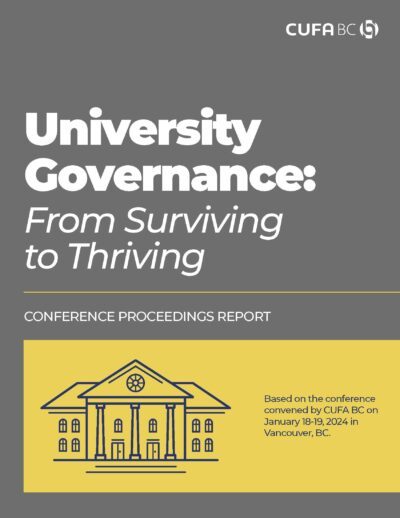For many years, CUFA BC raised concerns about threats to collegial governance in Canadian universities. The issue is more urgent than ever in the wake of the pandemic, which saw many governance norms bypassed, with lasting consequences, and amid increasing external pressures such as underfunding and government interference.
At the start of 2024, CUFA BC brought together over 100 faculty, administrators, union leaders, and policymakers to explore what’s going wrong and how we can do better. Our report captures their diverse perspectives on key issues, including the:
- Key roles and responsibilities outlined in our university acts
- Impact of the pandemic on university governance
- External factors driving the neoliberalization of Canadian universities
- Erosion of public trust, and opportunities to rebuild it
- Conflict, exclusion, and disengagement in university governance
- Marginalization of equity-deserving and contract faculty
- Role of collective bargaining in the senate and board
- Need for better expertise, capacity, and relationship-building in governance
This report goes beyond simply documenting the conference proceedings. It distills our presenters’ most compelling insights, hard-earned lessons, and forward-thinking strategies into an actionable resource. We hope this report provides a practical and inspiring guide for anyone looking to strengthen governance at their institution. Above all, it’s a call to refocus university decision-making on the core values of transparency, collegiality, and academic integrity.
Featured speakers
- Jaqueline Holler, Professor, University of Northern BC (UNBC)
- Julia Eastman, governance author, speaker, and advisor
- Mark Mac Lean, Professor, University of British Columbia (UBC)
- Rick Kool, Professor, Royal Roads University
- Glen Jones, Professor, University of Toronto
- Larry Savage, Professor & Senate Vice-Chair, BrockU
- Max Blouw, President, Research Universities’ Council of BC (RUCBC)
- James (Jim) Johnson, Professor, University of British Columbia Okanagan (UBC-O)
- Sarika Bose, Lecturer, University of British Columbia
- Kumari Beck, Associate Professor, Simon Fraser University (SFU) & President, SFU Faculty Association (SFUFA)
- Rheanna Robinson, Associate Professor, UNBC
- Cheryl Foy, President, Strategic Governance Consulting Services
- Jeff Hennessy, President & Vice Chancellor, AcadiaU
- Robin Whitaker, Vice-President, Canadian Association of University Teachers (CAUT)
- Marc Spooner, Professor, University of Regina
- Shannon Dea, Dean, Faculty of Arts, University of Regina
- Sue Wurtele, Associate Professor, Trent University & Past President, OCUFA
“One concrete suggestion I can make—and I think a point of great hopefulness—is for us all to pay attention to and articulate the importance of governance in an era of many rapid and inevitable changes, of which the pandemic was only one. This conference, then, gives me great hope for the future.” ~ Jacqueline Holler, Professor at University of Northern British Columbia.
“As long as universities exist, they're going to be governed. The only question is by whom and how? … Here in Canada, who governs universities is largely spelled out in provincial legislation. There is a lot of wisdom in many of those acts, but we shouldn't take them for granted. University acts change, and given current political trends, I think many of them may change in ways we in this room would be appalled by.” ~ Julia Eastman, governance author, speaker, and advisor
Faculty unions are a critical source of hope, said Shannon Dea, Dean at University of Regina. Dea felt optimistic about collegial governance despite it “often being true about apathy, neoliberalization, and managerialism.” Dea—who has participated in governance from “both sides of the divide” as faculty member and now administrator—asserted that “the existence of faculty associations is helping to maintain a firewall against global trends away from collegial governance.”
- Excerpt

